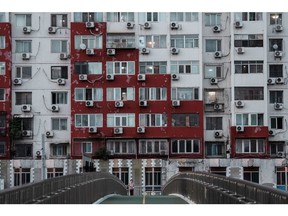
Article content
(Bloomberg) — China’s efforts to ensure power supply through punishing summer heat are getting a boost from a government trade-in program that’s allowed millions of households to upgrade to more efficient air-conditioners, according to a new report.
THIS CONTENT IS RESERVED FOR SUBSCRIBERS ONLY
Subscribe now to read the latest news in your city and across Canada.
- Exclusive articles from Barbara Shecter, Joe O'Connor, Gabriel Friedman, and others.
- Daily content from Financial Times, the world's leading global business publication.
- Unlimited online access to read articles from Financial Post, National Post and 15 news sites across Canada with one account.
- National Post ePaper, an electronic replica of the print edition to view on any device, share and comment on.
- Daily puzzles, including the New York Times Crossword.
SUBSCRIBE TO UNLOCK MORE ARTICLES
Subscribe now to read the latest news in your city and across Canada.
- Exclusive articles from Barbara Shecter, Joe O'Connor, Gabriel Friedman and others.
- Daily content from Financial Times, the world's leading global business publication.
- Unlimited online access to read articles from Financial Post, National Post and 15 news sites across Canada with one account.
- National Post ePaper, an electronic replica of the print edition to view on any device, share and comment on.
- Daily puzzles, including the New York Times Crossword.
REGISTER / SIGN IN TO UNLOCK MORE ARTICLES
Create an account or sign in to continue with your reading experience.
- Access articles from across Canada with one account.
- Share your thoughts and join the conversation in the comments.
- Enjoy additional articles per month.
- Get email updates from your favourite authors.
THIS ARTICLE IS FREE TO READ REGISTER TO UNLOCK.
Create an account or sign in to continue with your reading experience.
- Access articles from across Canada with one account
- Share your thoughts and join the conversation in the comments
- Enjoy additional articles per month
- Get email updates from your favourite authors
Sign In or Create an Account
or
Article content
The combined impact of the swaps could be enough to shave off 4.1% of residential electricity demand this summer, according to research published on Tuesday by climate think tank Ember. That’s enough electricity saved to power Iceland for an entire year. The initiative, which started last year and will continue at least through December, offers rebates to exchange older cooling units, other household appliances, and even vehicles for newer ones that are more energy efficient.
Article content
Article content
Article content
The efficiency boost comes as overall air-conditioning use exacts a heavy toll on China’s power system. Earlier this month, the country’s power demand hit a new peak 150 gigawatts higher than in 2024 — the equivalent of having to meet all of the electricity generation in France in just a year, according to BloombergNEF data. About 90% of that new load came from air-conditioners and refrigeration, according to a report in state-owned People’s Daily.
Article content
By signing up you consent to receive the above newsletter from Postmedia Network Inc.
Article content
The use of coolers has grown in China in recent years, as brutal summer heat and rising incomes drive sales of the power-sucking devices. The country had 146 air-conditioners per 100 homes in 2023, up from 31 in 2020, according to Ember. That surge has made the hotter months the clear peak demand season for the grid, and last year was a major factor in rising coal emissions despite rapid expansion in wind and solar plants.
Article content
“Rising residential cooling needs are adding increasing pressure to the power grid,” Biqing Yang, an Ember analyst, said in the report. “Integrating energy efficiency targets within economic stimulus measures presents a strategic opportunity to advance both economic growth and the clean energy transition.”
Article content
Article content
Air-conditioners can use variable fan speeds, different coolants and more optimal coiling designs to use less electricity to pump out the same amount of chilled air.
Article content
The trade-in program aims to promote the most efficient models, limiting power consumption while at the same increasing demand for goods from domestic factories. The government allocated 150 billion yuan ($21 billion) last year and another 300 billion this year for consumer rebates on more efficient electronics, household appliances and vehicles. Air-conditioner trade-ins will save consumers as much as $943 million in power bills this year, according to Ember.
Article content

.jpg) 6 hours ago
1
6 hours ago
1
 English (US)
English (US)